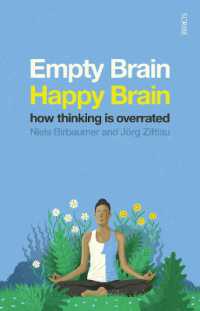- ホーム
- > 洋書
- > 英文書
- > Religion / Ethics
Full Description
Naturalistic ethics is the reigning paradigm among contemporary ethicists; in God and Cosmos, Baggett and Walls argue that this approach is seriously flawed. This book canvasses a broad array of secular and naturalistic ethical theories in an effort to test their adequacy in accounting for moral duties, intrinsic human value, prospects for radical moral transformation, and the rationality of morality. In each case, the authors argue, although various secular accounts provide real insights and indeed share common ground with theistic ethics, the resources of classical theism and orthodox Christianity provide the better explanation of the moral realities under consideration. Among such realities is the fundamental insight behind the problem of evil, namely, that the world is not as it should be. Baggett and Walls argue that God and the world, taken together, exhibit superior explanatory scope and power for morality classically construed, without the need to water down the categories of morality, the import of human value, the prescriptive strength of moral obligations, or the deliverances of the logic, language, and phenomenology of moral experience. This book thus provides a cogent moral argument for God's existence, one that is abductive, teleological, and cumulative.
Contents
Acknowledgments
Introduction
Introduction to Part I
Chapter 1: Alone in the Cosmos
Chapter 2: The Case for Abduction
Chapter 3: The Problem of Evil, Freedom, and Moral Responsibility
Introduction to Part II
Chapter 4: Moral Value
Chapter 5: Moral Obligations
Chapter 6: Moral Knowledge
Chapter 7: Moral Transformation
Chapter 8: Moral Rationality
Introduction to Part III
Chapter 9: A Moral Argument
Conclusion
Index








